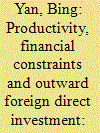|
|
|
Sort Order |
|
|
|
Items / Page
|
|
|
|
|
|
|
| Srl | Item |
| 1 |
ID:
182747


|
|
|
|
|
| Summary/Abstract |
Financial constraint is a significant obstacle for firm growth, especially in developing countries where credit is scarce. This paper explores the role of tax policy in relaxing firms' financial constraints by exploiting China's value-added tax (VAT) reform that was initiated in 2004 and completed in 2009. We use a quasi-experimental method and Annual Survey of Industrial Firms (ASIF) data from 2000 to 2009 to estimate the VAT reform's policy effects on financial constraints. We show that the VAT reform significantly improves firms' external financing capacity by decreasing borrowing costs and promoting commercial credit. The findings are robust to alternative specifications but show heterogeneity across ownerships, firm sizes, regions, and between export and non-export firms. Our analysis suggests tax deduction is useful to relax firms' financial constraints.
|
|
|
|
|
|
|
|
|
|
|
|
|
|
|
|
| 2 |
ID:
182715


|
|
|
|
|
| Summary/Abstract |
The human capital in management teams plays an increasingly important role in firms' governance and policies. We construct a comprehensive index of top management quality using a principal component analysis to empirically prove top management quality's positive impacts on corporate innovation. This study finds that higher-quality management teams tend to invest more in research and development projects and apply for more and higher-quality of patents. These results are consistent after conducting a series of robustness checks. We control for potential endogeneity using a firm fixed-effects model, the instrumental variable approach, and the propensity score-matching method. Three main channels are tested through which higher-quality top management teams will lead to higher innovation: higher tolerance for failure, easing of financial constraints, and more hiring of high-quality inventors. Finally, further analyses reveal that the positive effects of top management quality on innovation are more obvious for high-tech, state-owned, and growing enterprises.
|
|
|
|
|
|
|
|
|
|
|
|
|
|
|
|
| 3 |
ID:
168945


|
|
|
|
|
| Summary/Abstract |
Gaps in college completion persist between low- and high-income students. These disparities can be attributed in large part to a lack of college affordability and information asymmetries about the process of accessing financial assistance as well as other campus-based resources and supports. While substantial policy investments have been made to address these inequalities, such as expanded financial aid programs and increased investments in college advising, these programs are not always fully utilized by students who might benefit from them. In this essay, we apply a behavioral economics perspective to examine how financial constraints affect students' navigation of the complex processes–financial, academic, and otherwise–required to succeed in American higher education. We conclude with a discussion of evidence-based behavioral strategies that policy-makers and educators can draw on to proactively mitigate these behavioral obstacles and improve student success.
|
|
|
|
|
|
|
|
|
|
|
|
|
|
|
|
| 4 |
ID:
097367


|
|
|
| 5 |
ID:
182762


|
|
|
|
|
| Summary/Abstract |
This paper investigates the impact of social trust on a firm's adjustment speed toward an optimal capital structure. Leveraging the availability of generalized trust and personalized trust metrics in China, we find that, as expected, when a firm is located in a high social trust region (with either generalized or personalized trust), it adjusts more quickly toward its target capital structure. Moreover, we document that the impact of generalized trust (personalized trust) on the adjustment speed is magnified if the firm already had stringent financial constraints (less-severe agency problems) but it is not related to the severity of a firm's agency problems (financial constraints). Additional analysis suggests that the impact of social trust on capital structure dynamics is primarily through debt rather than equity. Furthermore, we find that when a firm is located in a weak formal institutional environment, the impact of generalized trust on the adjustment speed strengthens, suggesting that formal institutions and generalized trust are partial substitutes. Interestingly, the substitution effect of formal institutions and personalized trust is weak. Hence, the impact of generalized trust and personalized trust on capital structure adjustment share some similarities but differ in other respects.
|
|
|
|
|
|
|
|
|
|
|
|
|
|
|
|
| 6 |
ID:
139052


|
|
|
|
|
| Summary/Abstract |
Blue Economy is a relatively new concept and is resonating among a number of countries across the globe. It involves a number of interdependent sectors, which harness the wealth of the seas for economic growth through sustainable development to advance growth and enhance human security. Blue economy is slowly finding reference in the national maritime thinking among South Asian Countries and the national agendas acknowledge the potential of the seas for economic development. However, these countries face a number of technological and financial constraints to pursue the Blue Economy; but a pan-South Asian approach can help that dream come true.
|
|
|
|
|
|
|
|
|
|
|
|
|
|
|
|
| 7 |
ID:
159073


|
|
|
|
|
| Summary/Abstract |
This paper uses 13,766 firm-year observations between 2003 and 2013 from China to investigate the effects of monetary policy on corporate investment and the mitigating effects of cash holding. We find that tightening monetary policy reduces corporate investment while cash holdings mitigate such adverse effects. The cash mitigating role is especially significant for financially constrained firms, non-state-owned enterprises (non-SOEs) and those firms located in a less developed financial market. Cash holding also improves investment efficiency when monetary policy is tightening and tightening monetary policy enhances the ‘cash-cash flow’ sensitivity. Our empirical evidence calls for a critical evaluation on the monetary policies implemented in China which are less effective for state-owned enterprises. It also calls for a necessity for local government to further develop regional financial markets to protect vulnerable businesses, such as non-SOEs and financially constrained firms, from external shocks in order to maintain their sustainable growth and competitive advantages.
|
|
|
|
|
|
|
|
|
|
|
|
|
|
|
|
| 8 |
ID:
161767


|
|
|
|
|
| Summary/Abstract |
This paper studies the relationship between the financial constraints and outward foreign direct investment (OFDI) of Chinese enterprises. First, we construct a theoretical model and develop a series of hypotheses to analyze how productivity and financial constraints influence firms' OFDI decisions. Then we construct a multivariate index to measure internal and external financial constraints. Using Chinese Industrial Enterprises Database as well as the Database of OFDI Firms in China, our empirical finds that both productivity and financial constraints have important impacts on firms' OFDI decisions. In addition, the marginal effect of the financial constraints increases as firms' productivity rises; an effect felt more to the private enterprises than state-owned enterprises. Empirical results also indicate that external financial constraints affect the firms' OFDI decisions more greatly than the internal financial constraints.
|
|
|
|
|
|
|
|
|
|
|
|
|
|
|
|
| 9 |
ID:
147625


|
|
|
|
|
| Summary/Abstract |
We study how the presence of state-owned enterprises (SOEs) distorts private firms' decision on interprovincial sales in China. Using data from World Bank Investment Climate Survey and Annual Survey of Manufacturing Firms in China, we find evidence that the prevalence of SOEs in a city-industry where private firms reside will affect these firms' decision on the allocation of sales between interprovincial markets versus adjacent market. The direction of the effect on private firms, however, depends crucially on the private firms' access to credit. Specifically, the prevalence of SOEs leads to a higher propensity to sell to remote markets for firms with adequate financial access, whereas the opposite is true for firms who are credit constrained. We build a parsimonious model which links political/market distortion, market access, and credit constraint to explain these patterns, and argue that remote markets can serve as shelters for local distortions resulted from SOEs presence for some private firms.
|
|
|
|
|
|
|
|
|
|
|
|
|
|
|
|
| 10 |
ID:
150927


|
|
|
|
|
| Summary/Abstract |
Jordan plans to import two conventional gigawatt scale nuclear reactors from Russia that are expensive and too large for Jordan's current electricity grid. Jordan efforts to establish nuclear power might become easier in some ways if the country were to construct Small Modular Reactors, which might be better suited to Jordan's financial capabilities and its smaller electrical grid capacity. But, the SMR option raises new problems, including locating sites for multiple reactors, finding water to cool these reactors, and the higher cost of electricity generation. Jordan's decision has important implications for its energy planning as well as for the market for SMRs.
|
|
|
|
|
|
|
|
|
|
|
|
|
|
|
|
|
|
|
|
|